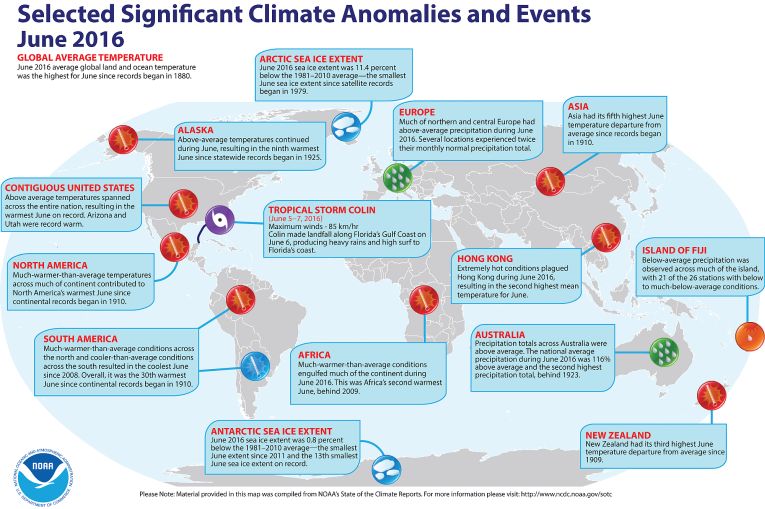We need to keep track of the unending temperature rise globally. Although your local temperatures may have been low, the Arctic (with terrible consequences expected on sea ice and ice sheets), Western USA, Russia, most of the Northern Hemisphere and many parts of southern continents are breaking records regularly. The best way of keeping in touch with reality is monthly rises. The global average for the first six months of this year was 1.3oC. (in Fahrenheit, 2.4o) higher than it was in 1900. It was 1.05oC. above the average for last century. There is more monthly data on these temperatures at the WMO site, using NOAA data.
But when we look at each month over the last year, they all break the record book. June was the 14th month of these records in a row. 2016 will be the hottest year we have information on. The CO2concentrations in air and water are reaching new highs too. A stunning rise this year has seen levels rise to 4ppm more than last year!
With or without such disappointments, global warming will not stop for many years, if at all. Our efforts to live up to Paris (Remember, remember, COP22 will be in November - in Marrakesh) can pay dividends, but the effect of cutting emissions can’t have any effect for up to a century!
Avoiding the key temperature rise of 2oC looks less likely with these monthly warmings, but Ban Ki-Moon has called in the world’s politicians to the UN on 21st September to ratify, accept, approve or whatever to the Paris Agreement. That gives them just a month to prepare for what could be the worst news ever.
This year has seen global warming on an unprecedented scale, enough to take several years. This takes place in only the first 6 months of the year. Perhaps it is time to begin spreading the message. Many fuels could be phased out now, while we search for more alternative forms of heating, cooling and travel that suit our environments. It is not only government that must move. We can even take advantage of new technologies by adopting them early or avoiding the wait until solar panels become ever more efficient or wind turbines work better and better at low inputs.
Problems exist, such as in the long wait for Samarkand’s solar farm, which we mistakenly thought had been built (or at least begun construction!) Our apologies for getting that wrong - the photograph shown is actually a site in Spain. Government, private enterprise or simply individual effort must be used and not abused in the haste to begin this renaissance of energy. We’ll see more when the counting at the UN starts in September, and the recriminations begin ---.










